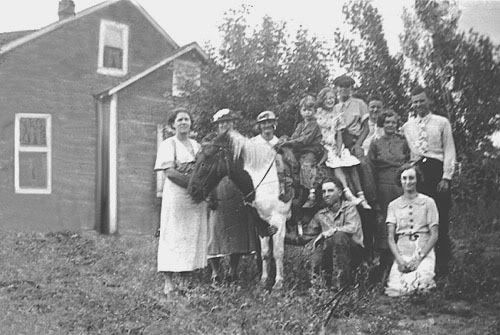
Growing up during the Great Depression my grandfather learned: “You had to work and work hard and spend your money wisely.” Extra spending money was scare as was extra clothes, food, and toys. However, Fred worked hard to get what he wanted. When he was eight years old, he worked all summer to save up his money for a wagon that cost $13 from the Spegal Catalogue. When Fred was asked why he wanted the wagon so much he explained: “I thought that the wagon would make my life more enjoyable.” Fred knew the wagon was capable of expanding the boundaries of a little boy’s imagination and helping out with the chores such as carrying in firewood. Fred worked and worked hard. He and his father worked on a cotton farm and picked cotton all summer. When Fred picked cotton, he filled his bag so full that he was not able to carry it himself and had to have his dad carry the bag for him. At the end of the summer he finally had enough money to buy a wagon and asked his father permission to buy the wagon with his extra money. Even though Fred’s father worked two jobs, there still was not enough money to buy desperately needed school clothes. Fred was crestfallen when his father told him his hard earned money was going to be used to buy new clothes. He remembers this moment as being one of the greatest disappointments of his childhood. Since then he has always longed for a wagon, and he finally got one for Christmas a couple years ago.
In 1943, Fred moved to Lancaster, California from his hometown, Ashland, Oklahoma, to stay with his older brother. Fred’s older brother was a foreman on a ranch and because so many men were fighting in the war and laborers were hard to come by, Fred was asked to work even though he was only fourteen. Fred worked hard at any job, “If you work for a man he pays you a wage. You have to earn that wage. Honest days work for honest days pay.” Fred was proud to say that as a fourteen year old he was paid a man’s wage of $58 a week. Fred would operate the farm machinery and do other odd jobs. One of Fred’s most embarrassing moments happened while he was working. He was fourteen years old when he was driving the pickup truck around on the farm. As he was driving he approached an irrigation ditch. He needed to get on the other side and instead of finding an alternative route, he backed the truck up, accelerated, and tried to fly the truck over the ditch. Well, all did not go as planned. The truck nose-dived into the ditch. Luckily Fred was not hurt, but the truck was in pretty bad shape. Fred was able to back the truck out of the ditch, but while he backed the truck out he ran into a plow and snapped the handles off of the plow. In the mean time Fred’s brother and the boss came to see what happened. Fred denied the entire thing, which was embarrassing because it was clearly evident that nobody else could have crashed the truck and he lied to his brother. Fred’s brother was upset at him, but their boss told Fred’s brother to calm down, leave Fred alone, and go get the truck fixed. Despite the embarrassing mishap and long hours of work, in his free time Fred enjoyed taking his girlfriend out on dates. One time during the state fair, Fred spent $20 on one date, which was a lot of money, but that was fine with him because he figured he was the richest 14 year old around.
